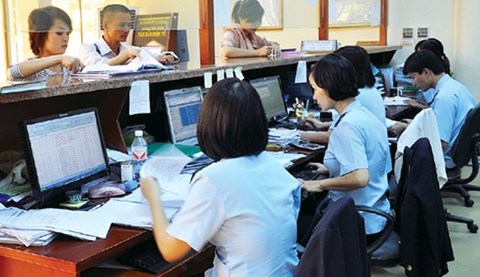
Customs office check for customs clearance procedures. — Photo tapchitaichinh.vn
Applying risk management in customs operations will not only enable trade security and facilitation but will also allow the General Department of Customs to focus its resources on high-risk trade, heard a workshop held in Ha Noi yesterday.
The workshop organised by General Department of Customs (GDC) and the US Agency for International Development (USAID) aimed to discuss the content of Circular 81, Decision 2218, and a new Voluntary Compliance Program for Traders with representatives of the private sector and customs officials from local customs departments in northern provinces in Viet Nam.
If successfully implemented, the programme will guide and give businesses the tools to self-assess and improve their compliance with customs regulations, cutting the time and cost to trade.
Hoang Viet Cuong, the GDC’s deputy general director said: “The General Department of Customs has gradually developed and completed the compliance assessment mechanism for four groups of customs declarants and warehouse, yard and port enterprises. We will publish criteria for assessment and classification on compliance and content on the application of risk management in customs operations.”
With technical assistance from the USAID Trade Facilitation Program, in November 2019, the Ministry of Finance issued its first legal document on risk management in Customs operations (Circular No 81/2019/TT-BTC dated November 15, 2019), together with Decision 2218/QD-TCHQ on implementing and applying risk management in customs operations (Decision 2218), which provides guidance on the adoption of risk management in customs operations for both customs authorities and the private sector.
Bradley Bessire, Deputy Mission Director of USAID Viet Nam said: “Over the past twenty years, USAID has supported Viet Nam in its efforts to institutionalise more open and predictable trade. Building on the normalisation of trade relations in 1995, USAID assistance to date is focused on the implementation of reforms to support Viet Nam’s increased market orientation.”
He added that with more than US$95 million in USAID trade facilitation technical assistance over the last two decades, Viet Nam has made substantive reforms to its legal framework governing many businesses in the trade sector.
These reforms were particularly effective in raising the economic governance capacity of government officials to respond to the needs of the private sector, and to improving the business enabling environment in Viet Nam so entrepreneurs and the economy can thrive.
"Over the course of our co-operation on trade facilitation, we jointly recognised continuing constraints at both the central and the provincial levels.
"To support Viet Nam, the five-year $21.7 million USAID Trade Facilitation Programme was launched to address gaps in specialised inspection in order to help Viet Nam accelerate implementation of the World Trade Organisation’s Trade Facilitation Agreements to simplify, modernise, and harmonise customs processes," he said. — VNS